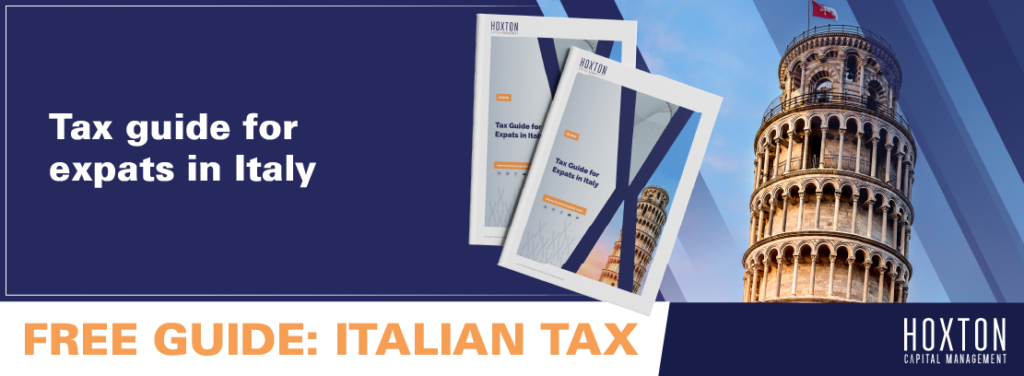An Italian tax guide for expatriates looking to understand the tax landscape and tax advantages.
This in-depth guide includes:
- Do expats pay income tax in Italy?
- Individual tax residency in Italy
- Registration within the register of the Italian resident population
- The Italian residence (Habitual Abode)
- Taxes to pay in Italy for Expats
- Italian taxes on capital
FAQs
If you live in Italy as a non-resident, you’re only taxed on income earned in Italy.
However, if you spend six months or more (183 days) in the country, you will be deemed a resident and subject to taxation accordingly. This rule also applies to non-residents whose primary interest or domicile is in Italy.
If you reside in Italy and spend over 183 days a year in the country while also having your “centre of economic interest” (including your business and investments) located in Italy, your global income will be liable to Italian taxation.
Italian income tax rates:
- Income between 0 and €15,000: 23%
- €15,000 – €28,000: 25%
- €28,000 – €50,000: 35%
- €50,000 –: 43%
Additionally, between 1,23% to 3,33% and may operate either on a progressive basis or at a flat rate, depending on the Region of residence
No.
In Italy, there is no specific personal allowance below which individuals are exempt from paying income tax. However, allowances are available for dependent family members, including a dependent partner and/or children. Furthermore, tax credits can be provided for mortgage interest, educational expenses, and medical bills.
The scheme known as “lavoratori impatriati” or “workers relocating to Italy” enables individuals who move their tax residence to Italy to enjoy reduced tax rates on their employment or self-employment income. Through this program, expatriates must only declare 30% of their earnings for taxation purposes during the initial five years. Moreover, if you reside in Abruzzo, Molise, Campania, Apulia, Basilicata, Calabria, Sardinia, or Sicily, you can reduce your taxable base to 10% of your total income.
Under this scheme, high net-worth individuals can pay a fixed amount of €100,000 annually instead of the regular Italian income tax. This lump sum replaces taxes on various sources such as earnings, foreign investments, and assets. Moreover, individuals utilising this scheme can include family members by paying an additional €25,000 for each family member.
All the things you need to know
Our tax advisers created this guide. Our advisers are some of the best in the world and understand the pains of having assets split worldwide. They have put together this easy-to-follow guide to help and inform all expatriates who may have questions about Italian tax.
This guide was last updated in May 2023.
How can we help you?
If you would like to speak to one of our advisers, please get in touch today.







